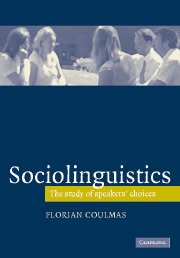Book contents
- Frontmatter
- Contents
- 1 Introduction: notions of language
- Part I Micro-choices
- 2 Standard and dialect: social stratification as a factor of linguistic choice
- 3 Gendered speech: sex as a factor of linguistic choice
- 4 Communicating across generations: age as a factor of linguistic choice
- 5 Choice and change
- 6 Politeness: cultural dimensions of linguistic choice
- Part II Macro-choices
- Glossary of terms
- References
- Internet resources
- Index
- References
5 - Choice and change
Published online by Cambridge University Press: 05 June 2012
- Frontmatter
- Contents
- 1 Introduction: notions of language
- Part I Micro-choices
- 2 Standard and dialect: social stratification as a factor of linguistic choice
- 3 Gendered speech: sex as a factor of linguistic choice
- 4 Communicating across generations: age as a factor of linguistic choice
- 5 Choice and change
- 6 Politeness: cultural dimensions of linguistic choice
- Part II Macro-choices
- Glossary of terms
- References
- Internet resources
- Index
- References
Summary
They say that time changes things, but you actually have to change them yourself.
Andy WarholCertaynly it is harde to playse every man, by cause of dyversité and change of language.
William Caxton (1422–91), Prologue to Eneydos‘To travel through Time!’ exclaimed the Very Young Man …. ‘One might get one's Greek from the very lips of Homer and Plato,’ the Very Young Man thought.
H. G. Wells, The Time MachineAs time goes by
Languages change through time. This simple statement seems to be equally trivial and easy to verify. Actually, it is a major intellectual challenge. For its appreciation requires two things, a notion of time and an understanding of how languages can be distinguished one from another. Just one of them is sufficient to cause a headache, taken together they pose a serious problem. The general form of the problem is this. The statement
(1) x changes in time.
presupposes an existential statement such as
(2) x exists.
But if x changes it is no longer x but x′. To deal with this difficulty, we might just modify our terminology and rephrase (1) as
(3) x is transformed into x′ in the course of time.
However, this is no solution to the problem because we have to come to terms with what distinguishes x from x′ and how we get from x to x′. Our original statement (1) is intuitively cogent, since experience tells us that yesterday's English and even last year's English has a lot in common with today's English.
- Type
- Chapter
- Information
- SociolinguisticsThe Study of Speakers' Choices, pp. 68 - 83Publisher: Cambridge University PressPrint publication year: 2005

